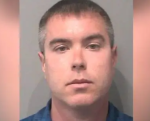
Source: BrianAJackson/Getty Images
MADISON COUNTY — The Indiana Commission on Judicial Qualifications announced that they have filed charges against Madison Circuit Court Judge Scott A. Norrick on Thursday.
The Commission says that Judge Norrick demonstrated a pattern of failing to properly supervise court staff and failing to properly take action in criminal cases.
Overall, Judge Norrick is being charged with four counts of misconduct. Three of the charges say that the Judge violated the Code of Judicial Conduct by failing to adequately supervise court staff in the processing of case entries and orders. It further states that this lack of supervision caused the dismissal of various criminal cases.
The charges are publicly available and outline a matter in which Judge Norrick did not properly disqualify himself from cases where a conflict of interest may have existed. Norrick previously worked as a lawyer for the company Landmark Accounts. Several of the company’s cases were assigned to and pending with the Madison Circuit Court 5, where Norrick was elected to.
Another aspect of this case causing a potential conflict of interest is that after Norrick was elected to the Madison Circuit Court, his son was the lawyer who took over representing Landmark Accounts. On April 2, 2022 The Indiana Commission on Judicial Qualifications received a complaint that Judge Norrick was presiding over cases where his son appeared as counsel.
Two months after the complaint was received Judge Norrick submitted a self-report acknowledging the potential conflict of interest. The notice states that while Norrick never presided over any cases involving Landmark Accounts, his staff improperly filed the cases, making it appear as though Judge Norrick had presided over them when a magistrate had instead.
The fourth charge states that Judge Norrick violated judicial canons by not properly taking action in approximately 40 criminal cases.
It claims that between January 1st, 2021, and March 31st, 2023, there were multiple cases with warrants that had not been updated, failures to set trial dates, and failure to indicate what had happened at hearings or if future hearings were needed. Approximately 16 of the 40 criminal cases observed resulted in a dismissal for not being tried in a timely manner under Indiana law.
The Supreme Court of Indiana will determine if any judicial misconduct occurred. Judge Norrick has 20 days to file an appeal.












